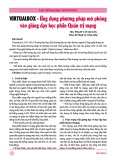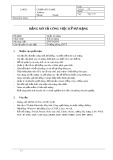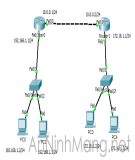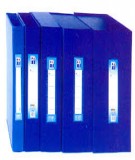
transfer would be done with sftp (in the SSH implementation known as Tectia, sftp is
confusingly invoked with the command scp2).
The point here is that both methods will transfer the fi le as long as every thing else
is set up correctly. The best book on SSH—SSH: The Secure Shell, by Daniel J. Barrett,
Richard E. Silverman, and Robert G. Byrnes (O’Reilly Media)—is about as long as this
one. Interested readers are referred to this text for more detailed information on SSH.
SSH IN ACTION
If there is one thing that was used more than FTP to produce this book, it’s SSH. In fact, all
of the fi le transfers used to consolidate output for these examples could just as easily have
been done with SCP or SFTP. This is especially true when routers are the remote systems:
Only in special circumstances will organizations allow or use Telnet for router access.
Let’s use SSH to contact the routers on the Illustrated Network. Naturally, the rout-
ers have been set up ahead of time to allow administrator access from certain hosts on
LAN1 and LAN2 and are running sshd. But on the client side, we’ll run ssh “out of the
box” and see what happens.
Ethereal captures are not the best way to look at SSH in action. The secure and
encrypted transfers make packet analysis diffi cult (and often impossible). Fortunately,
we can use the debug feature of SSH itself to analyze the exchange in very verbose
form (using the –vv option).
Let’s see if we can catch SSH-TRANS, SSH-AUTH, and SSH-CONN in action when we
access router TP2 (10.10.11.1) from bsdclient. We’ll log in (the -l option) as admin.
bsdclient# ssh -vv -l admin 10.10.11.1
OpenSSH_3.5p1 FreeBSD-20030924, SSH protocols 1.5/2.0, OpenSSL 0x0090704f
debug1: Reading configuration data /etc/ssh/ssh_config
debug1: Rhosts Authentication disabled, originating port will not be trusted.
debug1: ssh_connect: needpriv 0
debug1: Connecting to 10.10.11.1 [10.10.11.1] port 22.
debug1: Connection established.
debug1: identity file /root/.ssh/identity type -1
debug1: identity file /root/.ssh/id_rsa type -1
debug1: identity file /root/.ssh/id_dsa type -1
debug1: Remote protocol version 1.99, remote software version OpenSSH_3.8
debug1: match: OpenSSH_3.8 pat OpenSSH*
debug1: Enabling compatibility mode for protocol 2.0
debug1: Local version string SSH-2.0-OpenSSH_3.5p1 FreeBSD-20030924
debug1: SSH2_MSG_KEXINIT sent
debug1: SSH2_MSG_KEXINIT received
debug2: kex_parse_kexinit: diffie-hellman-group-exchange-sha1,diffie-
hellman-
group1-sha1
debug2: kex_parse_kexinit: ssh-dss,ssh-rsa
debug2: kex_parse_kexinit: aes128-cbc,3des-cbc,blowfish-cbc,cast128-cbc,
arcfour,aes192-cbc,aes256-cbc,rijndael-cbc@lysator.liu.se
CHAPTER 25 Secure Shell (Remote Access) 649

debug2: kex_parse_kexinit: aes128-cbc,3des-cbc,blowfish-cbc,cast128-cbc,
arcfour,aes192-cbc,aes256-cbc,rijndael-cbc@lysator.liu.se
debug2: kex_parse_kexinit: hmac-md5,hmac-sha1,hmac-ripemd160,hmac-ripemd160@
openssh.com,hmac-sha1-96,hmac-md5-96
debug2: kex_parse_kexinit: hmac-md5,hmac-sha1,hmac-ripemd160,hmac-ripemd160@
openssh.com,hmac-sha1-96,hmac-md5-96
debug2: kex_parse_kexinit: none,zlib
debug2: kex_parse_kexinit: none,zlib
debug2: kex_parse_kexinit:
debug2: kex_parse_kexinit:
debug2: kex_parse_kexinit: first_kex_follows 0
debug2: kex_parse_kexinit: reserved 0
debug2: kex_parse_kexinit: diffie-hellman-group-exchange-sha1,diffie-
hellman-
group1-sha1
debug2: kex_parse_kexinit: ssh-rsa,ssh-dss
debug2: kex_parse_kexinit: aes128-cbc,3des-cbc,blowfish-cbc,cast128-cbc,
arcfour,aes192-cbc,aes256-cbc,rijndael-cbc@lysator.liu.se,aes128-
ctr,aes192-ctr,aes256-ctr
debug2: kex_parse_kexinit: aes128-cbc,3des-cbc,blowfish-cbc,cast128-
cbc,arcfour,aes192-cbc,aes256-cbc,rijndael-cbc@lysator.liu.se,aes128-
ctr,aes192-ctr,aes256-ctr
debug2: kex_parse_kexinit: hmac-md5,hmac-sha1,hmac-ripemd160,hmac-ripemd160@
openssh.com,hmac-sha1-96,hmac-md5-96
debug2: kex_parse_kexinit: hmac-md5,hmac-sha1,hmac-ripemd160,hmac-ripemd160@
openssh.com,hmac-sha1-96,hmac-md5-96
debug2: kex_parse_kexinit: none,zlib
debug2: kex_parse_kexinit: none,zlib
debug2: kex_parse_kexinit:
debug2: kex_parse_kexinit:
debug2: kex_parse_kexinit: first_kex_follows 0
debug2: kex_parse_kexinit: reserved 0
debug2: mac_init: found hmac-md5
debug1: kex: server->client aes128-cbc hmac-md5 none
debug2: mac_init: found hmac-md5
debug1: kex: client->server aes128-cbc hmac-md5 none
debug1: SSH2_MSG_KEX_DH_GEX_REQUEST sent
debug1: expecting SSH2_MSG_KEX_DH_GEX_GROUP
debug1: dh_gen_key: priv key bits set: 136/256
debug1: bits set: 1042/2049
debug1: SSH2_MSG_KEX_DH_GEX_INIT sent
debug1: expecting SSH2_MSG_KEX_DH_GEX_REPLY
debug1: Host '10.10.11.1' is known and matches the DSA host key.
debug1: Found key in /root/.ssh/known_hosts:1
debug1: bits set: 1049/2049
debug1: ssh_dss_verify: signature correct
debug1: kex_derive_keys
debug1: newkeys: mode 1
debug1: SSH2_MSG_NEWKEYS sent
debug1: waiting for SSH2_MSG_NEWKEYS
debug1: newkeys: mode 0
debug1: SSH2_MSG_NEWKEYS received
650 PART VI Security

debug1: done: ssh_kex2.
debug1: send SSH2_MSG_SERVICE_REQUEST
debug1: service_accept: ssh-userauth
debug1: got SSH2_MSG_SERVICE_ACCEPT
debug1: authentications that can continue: publickey,password,keyboard-
interactive
debug1: next auth method to try is publickey
debug1: try privkey: /root/.ssh/identity
debug1: try privkey: /root/.ssh/id_rsa
debug1: try privkey: /root/.ssh/id_dsa
debug2: we did not send a packet, disable method
debug1: next auth method to try is keyboard-interactive
debug2: userauth_kbdint
debug2: we sent a keyboard-interactive packet, wait for reply
debug1: authentications that can continue: publickey,password,keyboard-
interactive
debug2: we did not send a packet, disable method
debug1: next auth method to try is password
admin@10.10.11.1's password: (not shown)
debug2: we sent a password packet, wait for reply
debug1: ssh-userauth2 successful: method password
debug1: channel 0: new [client-session]
debug1: send channel open 0
debug1: Entering interactive session.
debug2: callback start
debug1: ssh_session2_setup: id 0
debug1: channel request 0: pty-req
debug1: channel request 0: shell
debug1: fd 3 setting TCP_NODELAY
debug2: callback done
debug1: channel 0: open confirm rwindow 0 rmax 32768
debug2: channel 0: rcvd adjust 131072
--- JUNOS 8.4R1.3 built 2007-08-06 06:58:15 UTC
admin@CE0>
The substantial output captures all three phases of SSH protocol operation (all but SSH-
SFTP). Let’s see what the major portions of this listing are saying.
Roughly speaking, the fi rst half of the output is SSH-TRANS negotiation to estab-
lish the methods to use for key exchange, and what to use for cipher, integrity, and
compression. The next quarter is used for SSH-AUTH to decide on a user authentication
method to be used (its password). The last quarter, after the password is entered, is SSH-
CONN (setting up SSH channel 0 from router to client).
It’s not necessary to parse this line by line. Generally, the exchange starts by pars-
ing the version string supplied by the router and starting the negotiation. The router
announces support for SSH1 or SSH2 (version 1.99).
debug1: Remote protocol version 1.99, remote software version OpenSSH_3.8
debug1: match: OpenSSH_3.8 pat OpenSSH*
debug1: Enabling compatibility mode for protocol 2.0
CHAPTER 25 Secure Shell (Remote Access) 651

The client announces OpenSSH support as well.
debug1: Local version string SSH-2.0-OpenSSH_3.5p1 FreeBSD-20030924
Now the process shifts to binary packet mode and begins in earnest. The next major
section presents the router and client support set for key exchange, cipher, integrity,
and compression.
debug1: SSH2_MSG_KEXINIT sent
debug1: SSH2_MSG_KEXINIT received
debug2: kex_parse_kexinit: diffie-hellman-group-exchange-sha1,diffie-
hellman-group1-sha1
debug2: kex_parse_kexinit: ssh-dss,ssh-rsa
debug2: kex_parse_kexinit: aes128-cbc,3des-cbc,blowfish-cbc,cast128-
cbc,arcfour,aes192-cbc,aes256-cbc,rijndael-cbc@lysator.liu.se
debug2: kex_parse_kexinit: aes128-cbc,3des-cbc,blowfish-cbc,cast128-
cbc,arcfour,aes192-cbc,aes256-cbc,rijndael-cbc@lysator.liu.se
debug2: kex_parse_kexinit: hmac-md5,hmac-sha1,hmac-ripemd160,hmac-ripemd160@
openssh.com,hmac-sha1-96,hmac-md5-96
debug2: kex_parse_kexinit: hmac-md5,hmac-sha1,hmac-ripemd160,hmac-ripemd160@
openssh.com,hmac-sha1-96,hmac-md5-96
debug2: kex_parse_kexinit: none,zlib
debug2: kex_parse_kexinit: none,zlib
The fi rst two lines exchange the messages, which are parsed in pairs in the
following. The fi rst pair establishes the key exchange algorithms that the client under-
stands (diffie-hellman-group-exchange-sha1,diffie-hellman-group1-sha1), and the
second establishes the key types (ssh-dss, ssh-rsa). The other three pairs show that the
client and server both support the same methods in the other three categories. (It’s not
unusual for servers to support methods more than clients.) A long section of back-and-
forth negotiation takes place to pare down the possibilities, and fi nally the client and
server agree on what three methods to use for cipher, integrity, and compression.
debug1: kex: server->client aes128-cbc hmac-md5 none
debug1: kex: client->server aes128-cbc hmac-md5 none
Still, in SSH-TRANS, the actual key exchange and server authentication now begin.
Fortunately, it’s really the correct router.
debug1: SSH2_MSG_KEX_DH_GEX_REQUEST sent
debug1: expecting SSH2_MSG_KEX_DH_GEX_GROUP
debug1: dh_gen_key: priv key bits set: 136/256
debug1: bits set: 1042/2049
debug1: SSH2_MSG_KEX_DH_GEX_INIT sent
debug1: expecting SSH2_MSG_KEX_DH_GEX_REPLY
debug1: Host '10.10.11.1' is known and matches the DSA host key.
debug1: Found key in /root/.ssh/known_hosts:1
debug1: bits set: 1049/2049
debug1: ssh_dss_verify: signature correct
652 PART VI Security

The router is known because we’ve accessed it before (many times, in fact). If we
go somewhere we’ve never been before, we have the option to break off the session
because the server cannot be authenticated.
debug1: SSH2_MSG_KEX_DH_GEX_REQUEST sent
debug1: expecting SSH2_MSG_KEX_DH_GEX_GROUP
debug1: dh_gen_key: priv key bits set: 145/256
debug1: bits set: 1006/2049
debug1: SSH2_MSG_KEX_DH_GEX_INIT sent
debug1: expecting SSH2_MSG_KEX_DH_GEX_REPLY
debug2: no key of type 0 for host 10.10.12.1
debug2: no key of type 1 for host 10.10.12.1
The authenticity of host '10.10.12.1 (10.10.12.1)' can't be established.
DSA key fingerprint is 51:5f:da:41:41:9d:b1:c0:3f:a7:d0:a8:b9:7c:99:aa.
Are you sure you want to continue connecting (yes/no)?
At last we’re fi nished with SSH-TRANS. Now SSH-AUTH is used to authenticate the
“user account” to the server. We derive some new keys for the process, and fi nally
(because nothing else “works”) allow the user to type in a password for the router.
debug1: kex_derive_keys
debug1: newkeys: mode 1
debug1: SSH2_MSG_NEWKEYS sent
debug1: waiting for SSH2_MSG_NEWKEYS
debug1: newkeys: mode 0
debug1: SSH2_MSG_NEWKEYS received
debug1: done: ssh_kex2.
debug1: send SSH2_MSG_SERVICE_REQUEST
debug1: service_accept: ssh-userauth
debug1: got SSH2_MSG_SERVICE_ACCEPT
debug1: authentications that can continue: publickey,password,keyboard-
interactive
debug1: next auth method to try is publickey
debug1: try privkey: /root/.ssh/identity
debug1: try privkey: /root/.ssh/id_rsa
debug1: try privkey: /root/.ssh/id_dsa
debug2: we did not send a packet, disable method
debug1: next auth method to try is keyboard-interactive
debug2: userauth_kbdint
debug2: we sent a keyboard-interactive packet, wait for reply
debug1: authentications that can continue: publickey,password,keyboard-
interactive
debug2: we did not send a packet, disable method
debug1: next auth method to try is password
admin@10.10.11.1's password:
Although it is diffi cult to tell from the debug messages, there is a signifi cant wait
after the password is typed in while SSH-CONN sets up channel 0 over the SSH-TRANS
connection. But fi nally we’re in an interactive session and all set to go.
CHAPTER 25 Secure Shell (Remote Access) 653





![Routing trên GNS3: Tài liệu [mới nhất]](https://cdn.tailieu.vn/images/document/thumbnail/2015/20151202/gaugau1905/135x160/1662039810.jpg)




![Lập trình hệ thống mạng (Nguyễn Hữu Thể): Web service [chuẩn nhất]](https://cdn.tailieu.vn/images/document/thumbnail/2013/20131105/123tien0o0/135x160/4641383635482.jpg)















